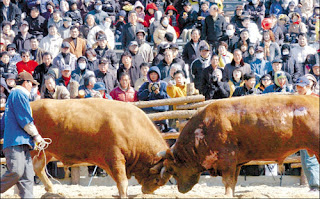No bull

Not only aren't the bulls killed in traditional Korean style bullfighting, they are paid a salary "in keeping with their status as professional athletes."
INSIDE JoongAng Daily: "JINJU, South Gyeongsang ― The fighting bulls of Jinju will now be receiving an annual performance-based “salary” in keeping with their status as professional athletes, the Jinju Bull Fighting Association announced yesterday.
How much each bull will receive will depend on his record in the ring.
The point of giving the massive fighters a regular stipend ― to be spent, of course, by their owners ― is to prevent severe injuries to the animals occasioned by owners forcing their charges to fight frequently in hopes of earning prize money. The current system awards only the winners of the battles and as a result cash-flow for owners is unsteady and the animals may be at risk of stomping and snorting their way into serious harm.
Korean bull fights, unlike the Spanish variety, are fights between two bulls butting each other with heads and horns. There is no expectation that the animals will die as they try to push each other backwards. While in the Spanish blood-sport a matador is expected to slay the beast, here the first bull to back off loses and is herded back to the showers to await another match, another day. The traditional events are promoted by several local governments and gambling on the fights is illegal.
The history of bull fights here goes back more than 2,000 years, according to an article in Meatline, a monthly magazine, which noted that today’s bulls are double the size of competitors 30 years ago, tipping the scales at up to 1,200 kilograms.
Under the new system each of the 100 or so bulls competing in the Jinju league will get between 5 million won ($5,400) and 10 million won in the first year.
The number of annual bullfight festivals held in Jinju is being reduced to just one, to be held in the autumn. This year’s festival concluded earlier this month. The so-called salaries will come from a pool of about 100 million won in prize money.
In addition to the festival, salaried bulls will compete on a weekly basis for about six months of the year. The current system of rewarding only top winners forced owners to sell losing bulls for low prices. The association wants to guarantee that owners make enough money to sustain the league.

Comments